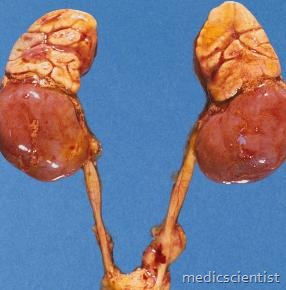Article Contents ::
Adrenal Gland Diseases
- 9V7GZUQ7PBG5
- The adrenal cortex produces 3 steroids:
- 9V7GZUQ7PBG5 9V7GZUQ7PBG5
- 1. Glucocorticoids
- 2. Mineralocorticoids
- 3. Adrenal androgens
The function of these steroids are:
- 1. Glucocorticoids – modulate intermediary metabolism and immune responses of the body.
- 2. Mineralocorticoids – Regulate blood pressure, vascular volume and electrolytes.
- 3. Adrenal androgens are responsible for secondary sex characters in females. (In males sexual characteristics are regulated by the gonadal steroids viz. testosterone).
- The most important function of the adrenal gland is secretion of cortisol (hydrocortisone) in response to stress.
Disorders of adrenal gland may be :
- · Hyperfunction or Cushing’s syndrome
- · Hypofunction or adrenal insufficiency.
- The release of adrenal cortical hormones occurs in response to ACTH or adrenocorticotropic hormone released by the anterior pituitary gland. ACTH is re=leased from anterior pituitary gland in response to corticotropin releasing hormone or CRH, released by the hypothalamus.
- CRH is inhibited by ACTH levels and ACTH is inhibited by cortisol levels in plasma.
- There are peak ACTH levels before waking up and low ACTH levels before sleeping.
1. Glucocorticoids
- The most important glucocorticoid is cortisol.
- Daily secretion of cortisol is between 15 – 30 mg. The liver is the major organ which inactivates steroids.
- The cortisol is secreted in pulses according to circadian rhythm, high just before waking up and low before sleepi ng.
- ACTH and cortisol levels increase with stress, eating, surgery, fever, hypoglycemia, exercise, emotional trauma.
- Glucocorticoid administration suppresses ACTH release and ACTH levels in plasma falls.
- Cortisol levels suppress ACTH release from pituitary and release of CRH as well.
- Prolonged glucocorticoid therapy results in adrenal atrophy, suppression of ACTH, and suppression of CRH release. If CRH is given to such patients then there is a rise in plasma ACTH.
- All glucocorticoids have some mineralocorticoid properties. The main action of glucocorticoids is production of energy via glucose. The glucocorticoids also regulate protein, carbohydrate, lipid and nucleic acid metabolism.
- Glucocorticoids raise blood sugar levels by opposing the actions of insulin, inhibiting glucose uptake, and promoting glucose synthesis by the liver (gluconeogenesis). It also causes increase in breakdown of proteins and excretion of nitrogen (catabolic action).
- Glucocorticoids have anti-inflammatory properties due to suppression of cytokines.
- Elevated glucocorticoid levels in response to stress protect the organism in many ways and prevent hypotension, shock and death.
- In patients with adrenal insufficiency glucocorticoid administration can save life.
2. Mineralocorticoids
- Daily secretion of aldosterone, which is the most important mineralocorticoid is between 50 to 250 IJg.
- Renin produced in the kidney acts on angiotensinogen to form angiotensin 1.
- Angiotensin I is converted to angiotensin II by angiotensin converting enzyme (ACE).
- Angiotensin II stimulates the Zona glomerulosa of
- . adrenal cortex to secrete aldosterone.
- Aldosterone levels in plasma increase sodium retention by the kidneys, causing expansion of extra cellular fluid volume and decreased release of renin. •
- When normal individuals are given aldosterone it causes sodium retention followed by natriuresis and within 3 days sodium balance is again maintained. Therefore, edema does not develop.
- This process is called the escape phenomenon because the renal tubules lose the capability to respond to sodium-retaining action of aldosterone.
- Aldosterone causes a loss of potassium which goes on increasing without any escape resulting in hypokalaemia.
- Aldosterone secretion is controlled by renin angiotensin system (RAS), potassium and ACTH.
- · Angiotensin II stimulates aldosterone secretion.
- · Potassium ion stimulates aldosterone secretion.
- · ACTH stimulates aldosterone secretion.
3. Adrenal androgens
- The major androgen secreted by adrenal is dehydroepiandrosterone (DHEA), 15 – 30 mg daily.
- Adrenal androgens have almost no effect in males because in males the sex characteristics are regulated by testosterone. In females adrenal androgens are responsible for secondary sex characteristics.


